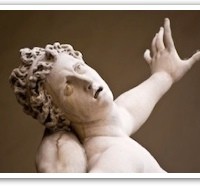L’economia in una lezione di Hazlitt, by Marco Respinti
Correva il 1946, l’Europa era piagata dalle distruzioni della Seconda guerra mondiale (1939-1945), gli Stati Uniterano in ginocchio per lo sciagurato statalismo imposto loro dall’interminabile presidenza di Franklin D. Roosevelt (1882-1945) e il resto del mondo si dibatteva tra guai antichi e nuove schiavitù, attorcigliandosi sempre più nelle nefaste conseguenza che la lunga «guerra civile europea» aveva disseminato per l’intero pianeta e sprofondando nell’oramai apparentemente irrefrenabile avanzare del totalitarismo comunista.
Il 1946 che in pratica spezza in due il Novecento ha insomma simboleggiato il centro stesso del secolo terribile, del «secolo delle idee assassine» (come lo ha definito Robert Conquest), del secolo davvero sin troppo lungo, altro che breve. Non c’era che da risalire, certo; ma allora, come sempre, la cosa è più facile a dirsi che a farsi. Qualcosa iniziò però a muoversi attorno a diverse figure di genio, una delle quali è l’indimenticabile Henry Hazlitt (1894-1993), statunitense. Economista, filosofo, critico letterario, uomo di solida formazione classica (dedicò un’opera anche al pensiero stoico), prolifico autore di numerosi volumi e saggi, il suo nome è inscindibile legato a quello di un libro: Economics in One Lesson, un manabile di buon senso intellettuale e pratico per difendere la libertà dai molti faraoni che nella storia mirano a fare scempio dell’anima umana.
Pubblicato proprio in quell’emblematico 1946. Titolo stringatissimo – anticipatore felice degli attuali, e spesso vuoti, «101», «Mille e un modi di….» o «100 risposte per…» –, quell’opera di Hazlitt si legge in un soffio, si capisce in un attimo e non si scorda mai. Sul web la si trova ovunque, in mille vesti, sempre disponibile gratis. Ora ve n’è, a decenni di distanza, anche un’utile traduzione italiana, L’economia in una lezione. Capire i fondamenti della scienza economica (IBL Libri, Torino 2012). Finalmente è stato colmato un buco imperdonabile (mentre in lingua spagnola lo è sin dal 1947, allorché l’Editorial Kraft, di Buenos Aires, ne predispose subito una traduzione).
Si dice che l’originale in lingua inglese abbia venduto più di un milione di copie negli Stati Uniti. Opera di alta divulgazione, L’economia in una lezione è uno di quei titoli che non morirà mai, che ha fatto epoca (e un’epoca che non tramonta), che ha cambiato la storia. Vero. Ma molta della sua straordinaria importanza è legata ai tempi e al modo in cui esso nacque. Ricordavo che dopo la pace armata seguita alla conclusione sanguinosa del secondo conflitto mondiale, prima ancora che la Cortina di ferro calasse all’Est con il famoso discorso di Winston Churchill (1874-1965), la riscossa dell’Occidente ferito ma non del tutto ancora sconfitto fu capace di generare, relativamente in fretta, molte e importanti reazioni costruttive. Fra queste vi fu certamente la nascita del moderno movimento conservatore statunitense. Bene inteso, all’epoca tutto esso era tranne che un «movimento», ma i semi gravidi di futuro erano già stati ben piantati. Comparvero dunque i primi intellettuali «non allineati», i primi uomini di cultura decisi a non arrendersi al cumulo di macerie, le prime, timide e povere organizzazioni della cosiddetta «società civile», qualche raro buon editore, certi libri ottimi e persino qualche periodico.
Read the complete article in Ragion Politica
A Summer With Virgil, by Bruce Thornton
From Homer’s Iliad to Thucydides’ Peloponnesian War, these five classics make for sublime and delightful beach reading.
“To read the Latin & Greek authors in their original,” Thomas Jefferson once wrote, “is a sublime luxury.” Fortunately, for those who don’t read Greek and Latin, the great works of Classical literature are available in first-rate translations. The following five classics are some of the best works from the astonishing variety and brilliance of Greek and Roman literature.
![]()
Homer, Iliad
The first work of Western literature was written around 750 B.C. The Iliad tells the story of only a few weeks from the ten years of the Greek war against Troy, ignited when Helen ran off with the Trojan Paris. But the Iliad is more than just a celebration of war and martial valor. To be sure, Homer’s admiration for men who will risk their lives in war for eternal glory is obvious, and his descriptions of fighting and dying are still some of the most vivid portraits of men at war we have.
But the Iliad offers much more: At its heart, it is a profound examination of what is best and worst in human nature, of what binds people together into a community and what tears them apart with bloody violence. As Homer tells the story of the “baneful wrath” of Achilles, the “best of the Achaeans,” over his dishonor at the hands of the ruler Agamemnon, he brilliantly shows us the destructive effects of the hero’s code of honor and vengeance against those, even friends, who fail to acknowledge his excellence and great deeds. Achilles’ quest for revenge, driven by a passionate anger he cannot control, in the end sacrifices his own community, his most beloved friend, and ultimately his own humanity. Homer teaches us that no society can survive when its ideals are based on personal honor and glory achieved through violence. Human community and human identity both depend on the “ties that bind,” the mutual obligations and affections we all, even the most brilliant of us, owe one another by virtue of being born into a tragic world of change, loss, and death.
Long before Aristotle, then, Homer understood that we are “political animals,” unable to live without our fellow humans because of our existential dependence on others. In the end, as we see in the moving scene in which the enemies Achilles and Priam, king of Troy, weep together over their lost loved ones, Homer teaches us that despite what divides us — no matter how exceptional our achievements and talents — it is our common subjection to time and death, and our dependence on other people we love and lose, that make us, for all our bestial passions, more than animals, and better than the immortal gods.
Read the complete article in CERC

